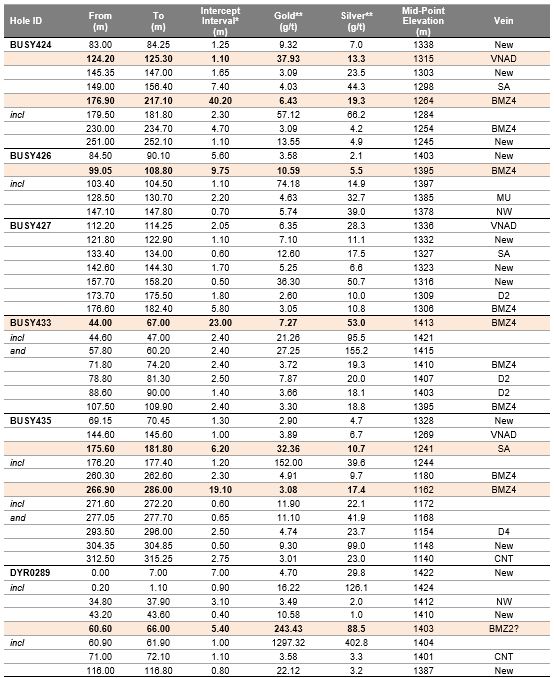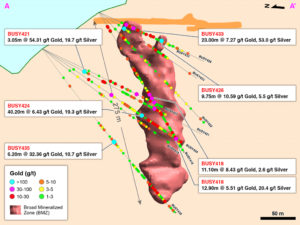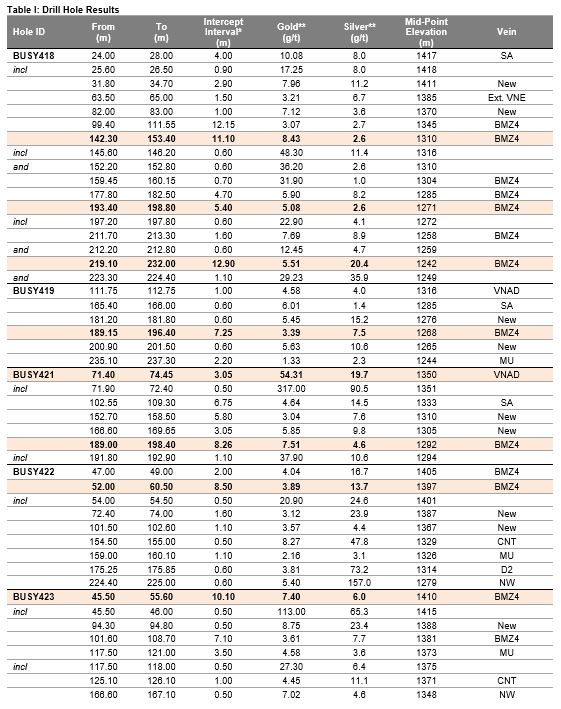- 10 diamond drill-holes targeting BMZ4 in the far-eastern portion of the Yaraguá system intercepted high-grade gold over thick continuous intervals. The majority of holes encountered narrow bands of visible gold and were drilled at or near perpendicular angles to the zone, with key results as follows:
o 40.20 metres @ 6.43 g/t gold and 19.3 g/t silver (BUSY424)
o 23.00 metres @ 7.27 g/t gold and 53.0 g/t silver (BUSY433)
o 11.10 metres @ 8.43 g/t gold and 2.6 g/t silver (BUSY418)
o 10.10 metres @ 7.40 g/t gold and 6.0 g/t silver (BUSY423)
o 9.75 metres @ 10.59 g/t gold and 5.5 g/t silver (BUSY426)
o 19.10 metres @ 3.08 g/t gold and 17.4 g/t silver (BUSY435)
- Drilling has extended BMZ4 down plunge by a further 75 metres with the zone now reaching the elevation of the Higabra Valley tunnel. The dimensions of BMZ4 now measure up to 45 metres across by 275 metres vertically. The zone remains open at depth.
- High-grade mineralization encountered in BMZ4 drilling is anticipated to be accretive to overall global resource growth as the mineralization lies either outside the boundary of the current mineral resource estimate block model or is located in areas that were estimated to be below the cut-off grade due to lack of previous information.
- The initial definition drill-hole targeting BMZ2 was terminated short of target yet nonetheless intercepted a very high-grade shallow dipping zone of mineralization at a slightly oblique angle with results as follow:
o 5.40 metres @ 243.43 g/t gold and 88.5 g/t silver (DYR0289)
The high-grade mineralization may be a lateral extension or a component of BMZ2 but further drilling in this area is required. Additional drilling is underway with further results anticipated in a timely manner.
- High-grade master veins, located predominately to the north of BMZ4, were intersected through drilling, with highlight results as follows:
o 6.20 metres @ 32.36 g/t gold and 10.7 g/t silver (BUSY435, SA vein)
o 3.05 metres @ 54.31 g/t gold and 19.7 g/t silver (BUSY421, AD vein)
o 1.10 metres @ 37.93 g/t gold and 13.3 g/t silver (BUSY424, AD vein)
Continental Gold Inc. [TSX:CNL; OTCQX:CGOOF] (“Continental” or the “Company”) is pleased to announce high-grade assay results for 11 diamond drill-holes drilled into the eastern portion of the Yaraguá system at its 100%-owned Buriticá project located in western Antioquia, Colombia. The Company plans to drill up to 73,500 metres in 2019, consisting of approximately 55,000 metres of capitalized definition drilling and approximately 18,500 metres of exploration drilling targeting broad mineralized zone (“BMZ”) targets. Supporting information for results discussed in this release can be found in Table 1 and Figures 1 and 2.
“Although still at a relatively early stage, BMZ4 is proving up to be an exciting new discovery and we have outlined a continuous vertical zone on the eastern margin of the Yaraguá system, a location which at present hosts no mineral resources or reserves, yet is located within 50 metres of existing underground development. We anticipate incorporating BMZ4 into future mine plans and will be looking to design wider stopes with potential to use bulk-style mining, including transverse extraction using primary and secondary stopes,” commented Ari Sussman, CEO. “With 10 rigs currently in operation, we will remain very active during the final stretch of our on-schedule construction targeting first gold pour in H1 2020.”
Assay results for all drill-holes reported in this release are reported in the table below:

** Grades herein are reported as uncapped values.
*** Mineralization intercepted within BMZ4 is generally estimated to be within 70-100% of true widths.

2. The quantity and grade of reported Inferred Mineral Resources in this estimation are uncertain in nature and there has been insufficient exploration to define these Inferred Mineral Resources as an Indicated or Measured Mineral Resource and it is uncertain if further exploration will result in upgrading the Inferred Mineral Resource to an Indicated or Measured Mineral Resource category.
3. Contained metal and tonnes figures in totals may differ due to rounding.
4. Gold equivalent grades and ounces was calculated at silver/gold ratio of 60:1. This formula is consistent with the May 11, 2015 Mineral Resource Estimate and is produced for comparative purposes only.
5. Mineral Resources have been prepared to a minimum 1 metre mining width.
6. Source: Company Technical Report entitled “NI 43‐101 Buriticá Mineral Resource 2019‐01, Antioquia, Colombia” dated March 18, 2019 with an effective date of January 30, 2019, led by independent consultants Ivor Jones Pty Ltd.
Geological Description of the Buriticá Project
Continental’s 100%-owned, 75,583-hectare project, Buriticá, contains several known areas of high-grade gold and silver mineralization, of base metal carbonate-style (“Stage I”) variably overprinted by texturally and chemically distinctive high-grade (“Stage II”) mineralization. The two most extensively explored of these areas (the Yaraguá and Veta Sur systems) are central to this land package. The Yaraguá system has been drill-outlined along 1,350 metres of strike and 1,800 vertical metres and partially sampled in underground developments. The Veta Sur system has been drill-outlined along 1,300+ metres of strike and 1,800 vertical metres and has been partially sampled in underground developments. Both systems are characterized by multiple, steeply-dipping veins and broader, more disseminated mineralization and both remain open at depth and along strike, at high grades.
BMZ Details
The BMZ consists of a group of modelled precious metal-bearing veins in the current mineral resource estimate block model with mineralization occurring between these veins, generally in the form of veinlets at oblique angles to strike. The majority of the mineralization between modelled veins is not in the current mineral resource estimate, providing potential upside both in terms of identifying significantly broader and more productive zones for mining and increased mineral resources. To date, the Company has identified up to seven BMZ targets for testing and will systematically drill each target zone as underground mine development advances.
BMZ4 is a three-dimensional orebody interpretation and modelling with variability in width, thickness along a vertical extension. Additional core drilling is been planned to define its characteristics, such as gold/silver grades, geometry and geomechanical properties.
Technical Information
David J Reading, M.Sc., FIMM, the special advisor to Continental and an independent Qualified Person as defined under Canadian National Instrument 43‑101 – Standards of Disclosure for Mineral Projects (“NI 43‑101”), has prepared or supervised the preparation of, or approved, as applicable, the technical information contained in this press release. Mr. Reading has over 35 years’ experience in the mining industry covering all stages of mine development, including exploration, feasibility, financing, construction and operations. He has an MSc in Economic Geology and is a Fellow of the Institute of Materials, Minerals and Mining.
Besides rigorous chain-of-custody procedures, the Company utilized a comprehensive quality control/quality assurance program for the channel samples. All quality control anomalies were addressed and/or corrected as necessary to assure reliable assay results; no material quality control issues were encountered in the course of the program. Crush rejects and pulps are kept and stored in a secured storage facility for future assay verification.
For exploration and infill core drilling, the Company applied its standard protocols for sampling and assay. HQ and NQ core is sawn or split with one-half shipped to a sample preparation laboratory in Medellín run by ALS Colombia Limited (“ALS”), whereas BQ core samples are full core. Samples are then shipped for analysis to an ALS-certified assay laboratory in Lima, Peru. The remainder of the core is stored in a secured storage facility for future assay verification. Blanks, duplicates and certified reference standards are inserted into the sample stream to monitor laboratory performance and a portion of the samples are periodically check-assayed at SGS Colombia S.A., a certified assay laboratory in Medellín, Colombia.
The Company does not necessarily receive assay results for drill holes in sequential order; however, all significant assay results are publicly reported.
For information on the Buriticá project, please refer to the technical report, prepared in accordance with NI 43‑101, entitled “NI 43‐101 Buriticá Mineral Resource 2019‐01, Antioquia, Colombia” and dated March 18, 2019 with an effective date of January 30, 2019, led by independent consultants Ivor Jones Pty Ltd. The technical report is available on SEDAR at www.sedar.com, on the OTCQX at www.otcmarkets.com and on the Company website at www.continentalgold.com.
About Continental Gold
Continental Gold is the leading large-scale gold mining company in Colombia and is presently developing it’s 100% owned Buriticá project in Antioquia. Buriticá is one of the largest and highest-grade gold projects in the world and is being advanced utilizing best practices for mine construction, environmental care and community inclusion. Led by an international management team with a successful record of discovering, financing and developing large high-grade gold deposits in Latin America, the Buriticá project is on schedule with first gold pour anticipated during the first half of 2020. Additional details on Continental Gold’s suite of gold exploration properties are also available at www.continentalgold.com.
For further information, please contact:
Paul Begin
Chief Financial Officer
Continental Gold Inc.
+1.416.583.5610
info@continentalgold.com
www.continentalgold.com


Forward-Looking Statements
This press release contains or refers to forward-looking information under Canadian securities legislation—including statements regarding: timing of drill results and first gold pour; advancing the Buriticá project; exploration results; potential mineralization; potential development of mine openings; potential improvement of mining dilution grades; reducing start-up risks; and exploration and mine development plans—and is based on current expectations that involve a number of significant business risks and uncertainties. Forward-looking statements are subject to other factors that could cause actual results to differ materially from expected results. Readers should not place undue reliance on forward-looking statements. Factors that could cause actual results to differ materially from any forward-looking statement include, but are not limited to, an inability to advance the Buriticá project to the next level, failure to convert estimated mineral resources to reserves, capital and operating costs varying significantly from estimates, the preliminary nature of metallurgical test results, delays in obtaining or failures to obtain required governmental, environmental or other project approvals, political risks, uncertainties relating to the availability and costs of financing needed in the future, changes in equity markets, inflation, changes in exchange rates, fluctuations in commodity prices, delays in the development of projects and the other risks involved in the mineral exploration and development industry. Specific reference is made to the most recent Annual Information Form on file with Canadian provincial securities regulatory authorities for a discussion of some of the factors underlying forward-looking statements. All the forward-looking statements made in this press release are qualified by these cautionary statements and are made as of the date hereof. The Company assumes no responsibility to update them or revise them to reflect new events or circumstances other than as required by law.
Differences in Reporting of Resource Estimates
This press release was prepared in accordance with Canadian standards for reporting of mineral resource estimates, which differ in some respects from U.S. standards. In particular, and without limiting the generality of the foregoing, the terms “inferred mineral resources,” “indicated mineral resources,” “measured mineral resources” and “mineral resources” used or referenced in this release are Canadian mineral disclosure terms as defined in accordance with NI 43-101 –under the guidelines set out in the Canadian Institute of Mining, Metallurgy and Petroleum (the “CIM”) Standards on Mineral Resources and Mineral Reserves (the “CIM Standards”). Until recently, the CIM Standards differed significantly from standards in the U.S. The U.S. Securities and Exchange Commission (the “SEC”) has adopted amendments to its disclosure rules to modernize the mineral property disclosure requirements for issuers whose securities are registered with the SEC under the U.S. Securities Exchange Act of 1934, as amended (the “Exchange Act”). These amendments became effective February 25, 2019 (the “SEC Modernization Rules”) with compliance required for the first fiscal year beginning on or after January 1, 2021. The SEC Modernization Rules replace the historical property disclosure requirements for mining registrants that were included in SEC Industry Guide 7, which will be rescinded from and after the required compliance date of the SEC Modernization Rules. As a result of the adoption of the SEC Modernization Rules, the SEC now recognizes estimates of “measured mineral resources”, “indicated mineral resources” and “inferred mineral resources”. In addition, the SEC has amended its definitions of “proven mineral reserves” and “probable mineral reserves” to be “substantially similar” to the corresponding definitions under the CIM Standards, as required under NI 43-101. Accordingly, during this period leading up to the compliance date of the SEC Modernization Rules, information regarding mineral resources or mineral reserves contained or referenced in this release may not be comparable to similar information made public by United States companies. Readers are cautioned that “inferred mineral resources” have a great amount of uncertainty as to their existence, and great uncertainty as to their economic and legal feasibility. It cannot be assumed that all or any part of an inferred mineral resource will ever be upgraded to a higher category. Under Canadian rules, estimates of inferred mineral resources may not form the basis of feasibility or other economic studies, except in limited circumstances. The term “resource” does not equate to the term “reserves”. Readers should not assume that all or any part of measured or indicated mineral resources will ever be converted into mineral reserves. Readers are also cautioned not to assume that all or any part of an inferred mineral resource exists, or is economically or legally mineable.

